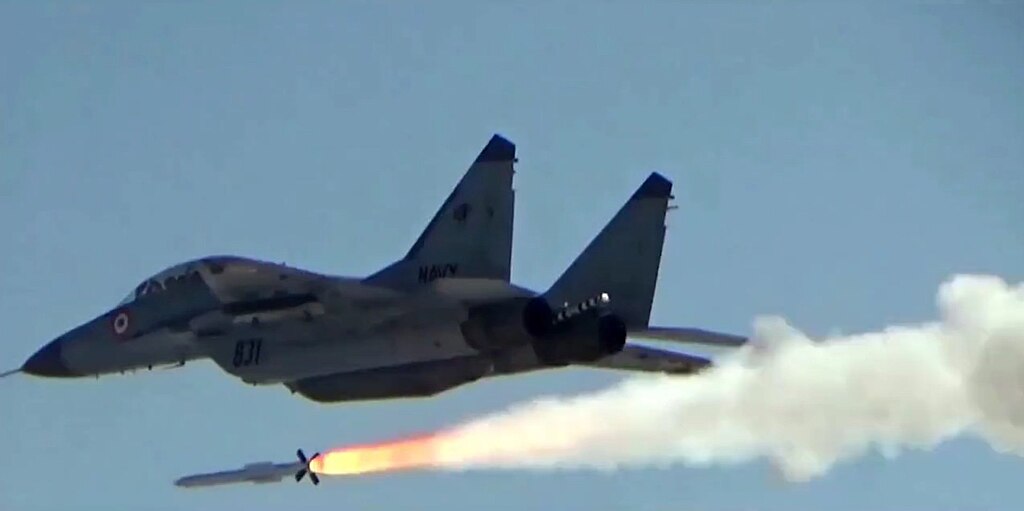
Pakistan’s latest attempts to use drones and missiles to target military stations in Jammu, Pathankot, Udhampur, and other strategic places were foiled by the Indian military on Thursday evening. The threats were successfully detected by Indian air defense systems, according to confirmation from the defense ministry.
The nation’s capital is on high alert. Guests at the famous war memorial, India Gate, were urged to leave and vacate the area earlier on Thursday. “This is a common procedure to maintain traffic flow in the C Hexagon. It has nothing new. “Anyone can come and see it tomorrow,” said Devesh Mahala, the Deputy Commissioner for New Delhi. “Police will remain vigilant and engaged. Vigil at night has been stepped up. A police officer declared, “We will use additional force in all sensitive areas.”
New Delhi’s security has been strengthened, and more forces—including paramilitary personnel—have been stationed at strategic locations. According to police sources who spoke to PTI, the deputy commissioners of each of the 15 districts are meeting with the special commissioners of each zone. “Every DCP keeps a close eye on local law and order. ACPs and SHOs are among the officers they have previously briefed. According to a source who spoke to PTI, Delhi Police is prepared to handle any situation, and DCPs are physically patrolling their area.
As tensions between the two nuclear-armed neighbors increased, the Indian military on Thursday night blocked new attempts by Pakistan to strike military installations in Jammu, Pathankot, Udhampur, and other locations. As Indian forces carried out extensive nighttime aircraft surveillance along the border, sirens and explosions were reported in Akhnoor, Samba, Baramulla, Kupwara, and several other locations. In a subsequent statement, the defense ministry confirmed that India is still “fully prepared to defend its sovereignty and ensure the safety of its people.”
“Military stations at Jammu, Pathankot, and Udhampur were targeted by Pakistani-origin drones and missiles along the International Border in Jammu and Kashmir today,” a spokeswoman for the defense ministry stated. Using both kinetic and non-kinetic capabilities, the threats were quickly eliminated in accordance with established Standard Operating Procedures (SOPs). Noting that the conflict has reached its second day and that the tense standoff is getting worse, the official stated, “No casualties or material losses were reported.”
According to military sources, India’s air defense systems successfully thwarted Pakistani military attempts to attack strategic targets in the towns of Satwari, Samba, RS Pura, and Arnia in Jammu.
Pakistani air defenses are struck by Indian response : The Indian military targeted and destroyed a Pakistani air defense installation in Lahore on Thursday morning with kamikaze drones in a counterattack. The defense ministry claimed that in response to the intensifying combat, Indian forces attacked radars and air defense sites at other locations in Pakistan with “equal intensity.” In a statement, the ministry highlighted the scope of the Indian response by saying, “It has been reliably learnt that an air defense system at Lahore has been Neutralised.”
Retaliation for the terror assault in Pahalgam : Less than twenty-four hours have passed since India repulsed a similar round of Pakistani drone and missile attacks. Pakistani forces attempted to attack military installations in 15 cities in northern and western India on Wednesday, according to the defense ministry. These cities include Awantipura, Srinagar, Jammu, Pathankot, Amritsar, Kapurthala, Jalandhar, Ludhiana, Adampur, Bathinda, Chandigarh, Nal, Phalodi, Uttarlai, and Bhuj. Indian military conducted precision attacks on nine terror infrastructure targets in Pakistan and Pakistan-occupied Kashmir in retaliation for the recent Pahalgam terror incident.
Amid escalating tensions, India promises a strong defense : Defence Minister Rajnath Singh stated that India is still ready to protect its sovereignty as the impasse worsens and issued a strong warning to anyone attempting to exploit India’s forbearance. “India has always played the role of a responsible nation, exercising great restraint and believing in resolving issues through dialogue,” Singh stated. He went on to emphasize India’s will to defend its land by saying, “However, if anyone tries to take advantage of this restraint, they will face quality action,”
